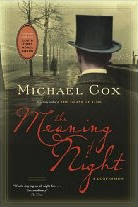 In a university archive lies a manuscript of uncertain provenance. Nineteenth century, certainly; but it could be fact or fiction or a mix of both. The author is a man who calls himself Edward Glyver, alias Glapthorne, alias several other things as well; and who opens his “confession” by telling how he killed a random passerby as practice for disposing of his enemy. That enemy is the successful, but now deservedly forgotten, poet (and possible criminal mastermind) Phoebus Rainsford Daunt. Edward has been dreaming of revenge on Daunt for years, and after the death of his mother he finds evidence to suggest that the list of grievances might be longer than he had thought.
In a university archive lies a manuscript of uncertain provenance. Nineteenth century, certainly; but it could be fact or fiction or a mix of both. The author is a man who calls himself Edward Glyver, alias Glapthorne, alias several other things as well; and who opens his “confession” by telling how he killed a random passerby as practice for disposing of his enemy. That enemy is the successful, but now deservedly forgotten, poet (and possible criminal mastermind) Phoebus Rainsford Daunt. Edward has been dreaming of revenge on Daunt for years, and after the death of his mother he finds evidence to suggest that the list of grievances might be longer than he had thought.
Patience is a virtue, and Edward has it in abundance as he methodically sets out to gather the evidence he needs to crush his enemy for good. He also has time - or he does until circumstances force him to speed up his plans. Worse, he soon realises he has an enemy closer at hand than Daunt.
The amount of research which must have gone into this book is phenomenal. I’m still not sure whether half the people or publications mentioned were real or not, but I like it when a book leaves me thus confused. That was the most appealling thing about Edward: his erudition and his love of books, and his instinctive liking for anyone who’s a fellow bibliophile (to which I can thoroughly relate). He showed a good deal of intelligence in pursuing his goal, and in laying out the mystery which twisted and turned and slowly unfolded. And to maintain the illusion that it was a genuine historical document, it had footnotes by the editor, J. J. Antrobus (there are some very cool names in here). I love novels with footnotes!
If only it had been a good hundred pages shorter. Or had a likeable main character. Edward introduces himself as someone willing to kill an innocent stranger to further his own ends, and doesn’t improve on acquaintance. He’s ruthless and has a massive sense of entitlement, and I actually hoped he would fail because I didn’t feel he deserved to succeed. I even questioned whether Daunt was the villain he was painted as, or whether it was all in Edward’s mind. This is a book to read for the plot, not the characters, but the former can’t quite compensate for the latter.
Rating: C











1 comment:
I had some of the same reaction as far as sympathizing with the protagonist, but for me, the good elements outweighed the bad. Did you know there's a sequel (sort of)? The Glass of Time.
Post a Comment